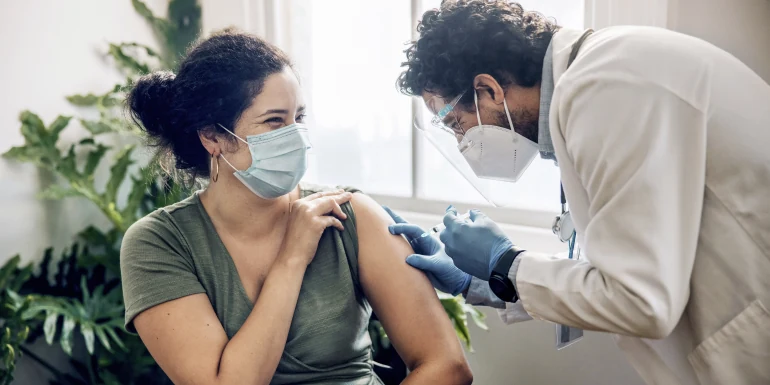
Stay healthy and safe when travelling in Thailand
Different countries, different health risks. Planning a trip to Thailand? Read about the illnesses and risks you may be exposed to in Thailand – and how you can protect yourself against these prior to travel.
What illnesses are there in Thailand?
Infected mosquitoes are among the main risks prevalent in Thailand. They transmit a range of illnesses to people. You can find a list of illnesses transmitted by mosquitoes in Thailand here:
Dengue fever is prevalent throughout the country. The infection risk is especially high in big cities and during the rainy season from May to October. The transmitting mosquitoes are primarily active during the day, but caution is advised at night too.
The symptoms of Dengue fever generally occur four to seven days after the mosquito bite. These usually include fever, rashes and severe joint and muscle pain and headaches. In most cases the illness will pass after a few days, and around 40 to 80% do not exhibit any symptoms. Only in very rare cases can Dengue fever lead to death.
Chikungunya fever is prevalent mainly in the south of Thailand.
Chikungunya virus is transmitted through bites from the Aedes aegypti mosquito. Symptoms generally occur within seven to nine days of being bitten. A fast-rising and high fever with severe joint pain and high sensitivity to touch are typical of the illness – and give it its name: “Chikungunya” translates as “bent walker”. In rare cases, those affected can also suffer from rashes. Within one to two weeks the symptoms usually subside without any long-term consequences.
The Zika virus makes an occasional appearance in Thailand too – primarily in the provinces of Chiang Mai, Chanthaburi, Phetchaburi and Bueng Kan. It is mainly transmitted by mosquito bites, but infection with the Zika virus is also possible through sexual contact. Special caution is advised during pregnancy: the virus can be transmitted to the foetus. That is why pregnant women are advised against travelling.
Zika virus infections are generally mild. It manifests itself in range of symptoms – such as fever, muscle pain and headaches, rashes, joint pain, conjunctivitis or vomiting – and generally goes away by itself within four to seven days. Serious neurological complications can occur in some very rare cases. In the majority of infections, those affected have absolutely no symptoms (asymptomatic). However, if an individual becomes infected during pregnancy, this can cause severe deformations in the foetus.
The malaria risk in Thailand is generally low. But in the rural areas along the border with neighbouring Myanmar, the risk of infection with malaria is higher. Central areas in the north of the country are malaria-free. The same goes for the cities of Bangkok, Chanthaburi, Chiang Mai, Chiang Rai, Pattaya, the Phuket peninsula and the island Ko Samui.
There are different types of malaria depending on the pathogen, so symptoms can vary too. Malaria tropica can cause a fever of over 38°C, shivering, headaches, muscle pain and sometimes vomiting and diarrhoea. Symptoms can occur six days after the disastrous mosquito bite. But note that sometimes the illness does not become apparent until years later. If malaria progresses quickly, the illness can lead to death.
The highest risk of infection with Japanese Encephalitis in Thailand is in the rural regions and in the south of Thailand – primarily during the rainy season.
Japanese Encephalitis is a viral infection of the brain. 90% of those infected do not notice the infection. In some rare cases – usually in older people or children between the ages of three and six – it can lead to meningitis. This can result in symptoms like headaches, seizures or clouding of consciousness.
How can you protect yourself from illnesses in Thailand?
Knowing the risks is half the battle. But how do you protect yourself against them? Here are a few tips for a safe trip:
Good mosquito protection
Numerous illnesses in Thailand are transmitted by mosquitoes. As of yet there are no vaccinations for many of these, so preventing mosquito bites is the best protection. How to protect yourself against mosquitoes:
- Wear long and light-coloured clothing
- Sleep under treated mosquito nets
- Use insect repellent containing the active ingredient DEET or icaridin, e.g. Anti Brumm Forte
- Spray your clothing and mosquito nets with permethrin, e.g. NOBITE Clothing
- Stick to rooms with insect screens and air-conditioning systems where possible
- Wash your feet and change your socks daily
Recommended vaccinations for Thailand and malaria protection
The good news: you can get vaccinated against some illnesses in Thailand – like Japanese Encephalitis – before travelling. There is additional protection for malaria too: a preventative treatment you can take beforehand or take with you for emergencies.
Seek advice from a specialist for travel medicine at least six to eight weeks before departure. The doctor will discuss with you which vaccinations are practical or necessary for your travel itinerary, and whether you should take preventive medication for malaria with you or before travelling.
Make sure you check which vaccinations are recommended for Thailand.
Other travel health tips
Depending on the regions you visit, the hygiene conditions prevalent in Thailand may be poorer than those in Switzerland. What's more, the high temperatures and high humidity offer ideal conditions for the growth of harmful organisms. Follow these health tips for long-haul journeys:
- Wash your hands frequently with soap. Dry them with unused hand towels. Take hand sanitiser with you.
- Stay away from animals and pets.
- Only swim in the sea and chlorinated pools.
- Bring condoms with you and do not have unprotected sex.
- Disinfect and treat even the smallest wounds.
Avoid fresh dishes and raw food:
- Avoid fresh dishes like salad, egg or mayonnaise.
- Stick to piping hot meals – at street food stands fresh from the oil or stock.
- Do not scrape the plate.
- Only eat fruit you can peel.
- Only drink boiled water – or from an industrially sealed bottle with intact safety rings.
- Avoid ice cubes in drinks.
Fever in Thailand: what should you do?
Do you have one of more of the symptoms above despite taking all protective measures? Sometimes infections cannot be avoided even with the best protection.
If you come down with fever during or after your stay in Thailand, you should see a doctor immediately. Inform them that you recently visited a malaria area.
How good is medical care in Thailand?
Medical care is guaranteed in Thailand. In the big Thai hospitals, the doctors speak English. Prior to treatment, hospitals ask for a financial guarantee, i.e. proof of your health insurance, your credit card or advance payment in cash. In this case, contact the Helsana Emergency Call Centre as a matter of urgency on +41 58 340 16 11. It will provide the cost guarantee, so you don’t have to pay a deposit.
If you are travelling to rural regions, the distance to the nearest hospital is usually longer and sometimes medical care can be scarce. The Helsana Emergency Call Centre will help you find a hospital.
Keep a well-stocked travel first aid kit with you in any case – especially if you depend on specific medication.
Read up on the travel information for Thailand
Not just health, but climatic, economic and cultural conditions overseas can pose unknown risks for us too. Make sure nothing stands in the way of safe journey – e.g. with regard to crime in certain parts of the city or tsunami warnings at certain times of year.
You can find all travel guidelines and information regarding the current situation in Thailand on the Federal Department of Foreign Affairs (FDFA) website.
Check your travel insurance for Thailand
Unfortunately we can never insulate ourselves fully from risk. If you need medical treatment in Thailand, this may have serious financial consequences for you. So make sure you have adequate insurance cover for emergencies before departing on your trip. For instance, TOP, COMPLETA and WORLD supplementary insurance policies can cover gaps in basic insurance.

The expert provided the editorial team with advice and input for this article. Julia Pieh (doctorate in pharmacy and toxicology, pharmacist, naturopath) works in the Helsana Health Consultation Service.


Newsletter
Find out more about current health issues every month and get all the information you need about our attractive offers from all Helsana Group companies * delivered by e-mail to read whenever it suits you. Our newsletter is free of charge and you can sign up here:
We did not receive your information. Please try again later.
* The Helsana Group comprises Helsana Insurance Company Ltd, Helsana Supplementary Insurances Ltd and Helsana Accidents Ltd.